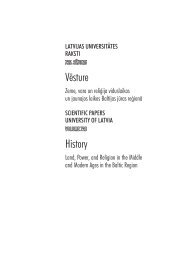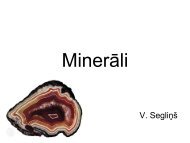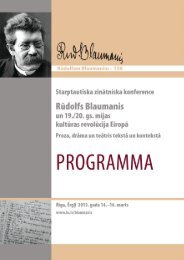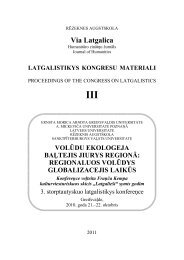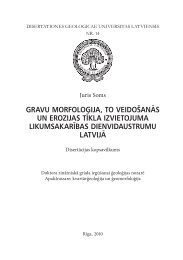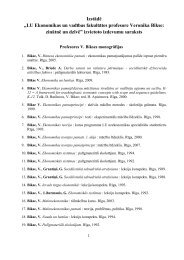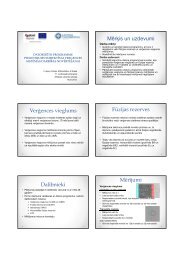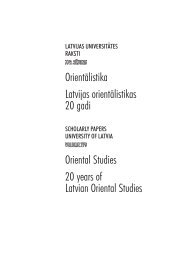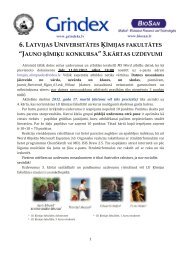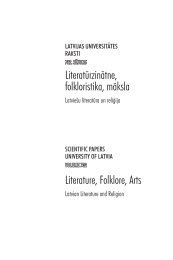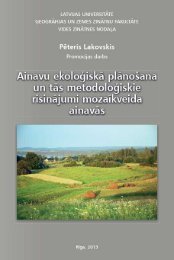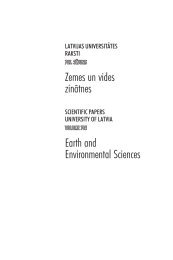Untitled
Untitled
Untitled
You also want an ePaper? Increase the reach of your titles
YUMPU automatically turns print PDFs into web optimized ePapers that Google loves.
30 LITERATÛRZINÂTNE, FOLKLORISTIKA, MÂKSLA<br />
8. It was not untill the middle of the nineteenth century that Latvians were allowed<br />
to practise the rights to deal with law, religion, professional arts and<br />
commerce. In the Soviet times Latvians were not allowed to practise seafaring<br />
professions that had been a traditional source of livelihood engagement<br />
for the native population since “time out of mind.” (Blackstone)ever. It was<br />
the new–comers and not the indigenous inhabitants of Latvia who took these<br />
niches. And that is why there still is no strong tradition among Latvians in<br />
these fields yet. As a result, we often witness insufficient ability of Latvia to<br />
defend her national interests on an international level and incapablity of creating<br />
an internationally recognizable image.<br />
9. The Soviet style of communication greatly has been preserved i.e.: 1) directing<br />
oneself to corporative or party–oriented interests instead of national interests; 2)<br />
misinterpretation of the term “national” to mean “ethnic” instead of “belonging<br />
to the state” or “stately”, with the ensuing problems; 3) groundless suspicion and<br />
the prevalence of conspiracy theories, popularity of the theory of conspiracy<br />
among the population as a consequence of the experience of numerous political<br />
treasons in the 20th century and the Soviet totalitarian system; 4) secrecy of decision<br />
making and implementation ; 5) lack of interpersonal skills and distrust<br />
of team work; 6) rudeness and bossiness towards the subordinates; 7) a loud and<br />
aggressive manner of speech.<br />
In a larger context Latvia occupies a unique place. Estonia has formed a close<br />
partnership with Finland partly because of a common ancestry. Lithuania, due to its<br />
history and a strong Catholic tradition, is closer to the traditional Catholic countries.<br />
As the contemporary Latvian poet and ex–President of the PEN Club of Latvia Knuts<br />
Skujenieks points out:<br />
If the Baltic states take a very special place in the panorama of Europe<br />
then Latvia takes a very special place in the Baltics. Historically Latvia<br />
had been lying on the crossroads not only of the Baltics but on the<br />
whole of East Europe. In ancient times it was here that the top people of<br />
Baltic and Finno–Ugrian tribes met, whereas the bulk of the tribes was<br />
living in neighboring areas which ethnically were more monolithic. It is a<br />
fact of historical importance that this conglomeration of ethnic diversity<br />
eventually became the Latvian nation. The echo of these remote times is<br />
still felt in the multicultural panorama of Latvia. For centuries the neighboring<br />
big powers had been partitioning and dividing our land and our<br />
people. And it was only in the twentieth century right after the First<br />
World War that Latvia became independent and united. 6<br />
It was starting from the thirteenth century the that tribes and clans who lived on<br />
the territory of Latvia built the Latvian nation by defending themselves against foreign<br />
invaders. Foreign invasion, on the one hand, stimulated the formation of the<br />
Latvian nation; whereas, on the other, it hindered its development by enslaveding its<br />
the people. In the fourteenth century Latvia marked the borderline between the western<br />
Hanseatic Union and the oriental Golden Horde, which actually was the genuine<br />
border between the West and the East. In a broader sense it was the demarcation line<br />
between the psychology of farmers and cattle–breeders. Farmer psychology is characterized<br />
by “the respect for any object of nature or a living being; no need to take



